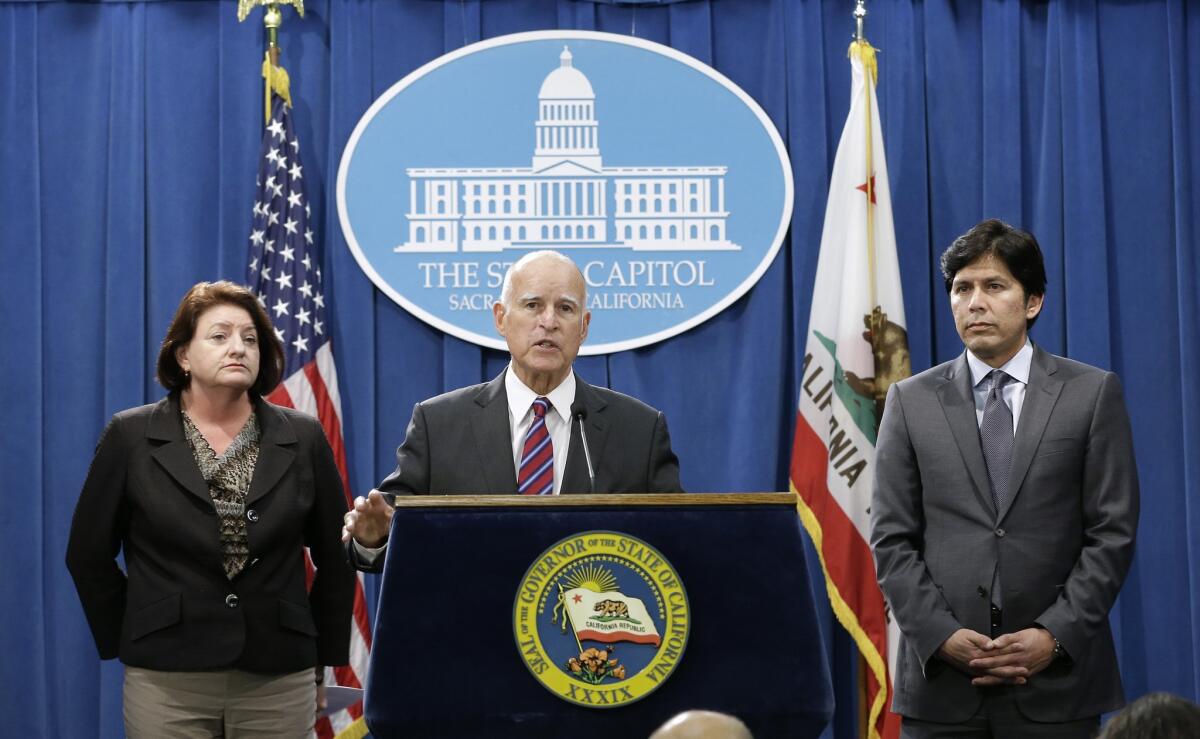Editorial: Why is the Legislature backsliding on climate change?

Calif. Gov. Jerry Brown, flanked by Assembly Speaker Toni Atkins, D-San Diego, left, and Senate President Pro Tem Kevin de Leon, D-Los Angeles, announced scaling back their climate change proposal during a Sept. 9 news conference in Sacramento.
- Share via
Could legislators in Sacramento possibly have fallen for the oil industry propaganda that cutting oil consumption would lead to gas rationing and a ban on SUVs? Are they so ignorant that they believe that an ongoing commitment to battling climate change is bad for California?
Most Republican legislators have long looked askance at tough greenhouse gas regulation. But now a new crop of moderate Democratic legislators has joined them to strip all mention of gasoline and other fuel oils from one climate change bill, SB 350. Meanwhile, another important climate bill, SB 32, appears to have lost steam.
There were legitimate concerns about the timeline in SB 350; it would have required the state to reduce oil use by 50% within the next 15 years. Even with ambitious new incentives and fuel standards, the chances of meeting that goal were iffy, largely because too many older cars would remain on the roads. That’s why this paper encouraged the bill’s author, Senate leader Kevin de León (D-Los Angeles), to make the bill more flexible.
But it soon became obvious that the Legislature would shrink from any worthwhile restrictions on oil. Two other aspects of the bill will go forward: energy efficiency standards for buildings, and a continuation of the state’s existing commitment to use renewable fuels for electricity generation. Petroleum, one of the biggest sources of greenhouse gas emissions, belongs in there too.
Even worse, SB 32 stalled in the Assembly and its chances of passage are far from assured. This is the “son” of AB 32, California’s signature climate-change law from 2006 that required the Air Resources Board to formulate a plan that would bring greenhouse gas emissions by 2020 down to where they had been in 1990. The state is on target to meet that goal, and SB 32 would tighten the noose on greenhouse gases, requiring emissions to drop by 40% from 1990 levels by the year 2030.
On Thursday, SB 32 was made into a two-year bill, giving it another chance in 2016. But it’s dismaying to see the Legislature turning away from the state’s leadership role on the climate front.
Meanwhile, an obviously angry Gov. Jerry Brown vowed to use his administrative powers to have the air board begin work on reducing oil consumption, SB 350 or no. That’s not enough in the long haul. What if the next governor doesn’t share Brown’s passion for combating climate change? The board needs statutory authority to do its work effectively. And California needs the kind of courageous Legislature that passed AB 32 and showed the rest of the nation how to respond to the world’s greatest environmental threat.
Follow the Opinion section on Twitter @latimesopinion and Facebook
More to Read
A cure for the common opinion
Get thought-provoking perspectives with our weekly newsletter.
You may occasionally receive promotional content from the Los Angeles Times.









